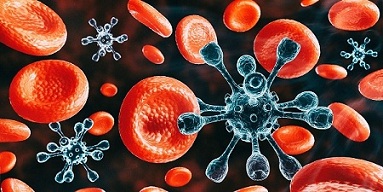German Researchers Say Johnson and Johnson’s and AstraZeneca’s COVID-19 Vaccine Blood Clots Are Due To Adenovirus Vector Issues And Can Be Fixed
Source: Vaccine News May 29, 2021 4 years, 7 months, 6 days, 20 hours, 24 minutes ago
German scientists from the Goethe-University of Frankfurt and Ulm University-Helmholtz have in a new study uncovered that the
COVID-19 vaccine blood-clot issues are actually caused as a result of side effects by adenovirus vector used in the vaccine delivery mechanism and that these issues can be fixed.

In the last few months, many countries have started the innoculation of millions of individuals by using vector-based vaccines.
Unfortunately, severe side effects became overt during these vaccination campaigns: cerebral venous sinus thrombosis (CVST), absolutely rare under normal life conditions, were found as a severe side effect that occurred 4-14 days after first vaccinations. Besides CVST, Splanchnic Vein Thrombosis (SVT) was also observed. This type of adverse event has not been observed in the clinical studies of AstraZeneca, and therefore led immediately to a halt in vaccinations in several European countries.
Such events were mostly associated with thrombocytopenia, and thus, similar to the well-known Heparin-induced thrombocytopenia (HIT).
The German study team has present data that may explain these severe side effects which have been attributed to adenoviral vaccines.
According to the study findings, transcription of wildtype and codon-optimized Spike open reading frames enables alternative splice events that lead to C-terminal truncated, soluble Spike protein variants. These soluble Spike variants may initiate severe side effects when binding to ACE2-expressing endothelial cells in blood vessels. In analogy to the thromboembolic events caused by Spike protein encoded by the SARS-CoV-2 virus, the study team termed the underlying disease mechanism the
“Vaccine-Induced Covid-19 Mimicry” syndrome (VIC19M syndrome).
The study findings were published on a preprint platform and are currently being peer reviewed.
https://www.researchsquare.com/article/rs-558954/v1
The study team claims to have cracked the cause of the rare blood clots linked to the Oxford/AstraZeneca and Johnson & Johnson coronavirus vaccines and believes the jabs could be tweaked to stop the reaction happening altogether.
Dr Rolf Marschalek, a professor at Goethe University in Frankfurt who has been leading studies into the rare condition since March, said his study showed the problem sat with the adenovirus vectors that both vaccines use to deliver the genetic instructions for the spike protein of the Sars-Cov-2 virus into the body.
This delivery mechanism alarmingly allows the vaccines to send the DNA gene sequences of the spike protein into the cell nucleus rather than the cytosol fluid found inside the cell where the virus normally produces proteins.
Once inside the cell nucleus, certain parts of the spike protein DNA are spliced, or split apart, creating mutant versions, which are unable to bind to the cell membrane where important immunization takes place. The floating mutant proteins are instead secreted by cells into the body, triggering blood clots in roughly one in 100,000 people, acco
rding to Dr Marschalek’s theory.
Interestingly in contrast, mRNA-based vaccines, such as the jabs developed by BioNTech/Pfizer and Moderna, deliver the spike’s genetic material to the cell fluid and it never enters the nucleus.
Dr Marschalek warned, “When these virus genes are in the nucleus they can create some problems.”
The rare blood-clotting reaction that has disrupted the rollout of the AstraZeneca and J&J shots has been recorded in 309 of the 33 million individuals who have received the AstraZeneca vaccine in the UK, causing 56 deaths.
Sadly in Europe, at least 142 people have experienced the blood clots out of 16 million recipients of the vaccine.
In response, use of the AstraZeneca jab has been restricted or suspended in more than a dozen countries.
J&J began the rollout of its vaccine in Europe with a warning on its label in April after a brief delay because of the concerns.
However Dr Marschalek believes there is a straight forward “way out” if the vaccine developers can modify the gene sequence that codes for the spike protein to prevent it splitting apart.
It was reported that J&J had already contacted Dr Marschalek’s lab to ask for guidance and was looking at ways to adapt its vaccine to prevent splicing.
Dr Marschalek added, “The instructions for the spike protein in the J&J shot were already less prone to ‘splicing’ than the instructions for the spike protein in the AstraZeneca jab, making the reaction less common.”
In America, eight of the 7.4 million recipients of the J&J shot have reported the rare reaction.
Dr Marschalek further added, “J&J is trying to optimize its vaccine now. With the data we have in our hands we can tell the companies how to mutate these sequences, coding for the spike protein in a way that prevents unintended splice reactions.”
Johnson and Johnson (J&J) spokesman added, “We are supporting continued research and analysis of this rare event as we work with medical experts and global health authorities. We look forward to reviewing and sharing data as it becomes available.”
Dr Marschalek said he had presented his lab’s findings to the German government’s Paul-Ehrlich Institute and to the country’s advisory body on vaccination and immunization.
He said, “They were surprised by our findings because no one was thinking about the splice problem.”
For more
COVID-19 Vaccine News, keep on logging to Thailand Medical News.
